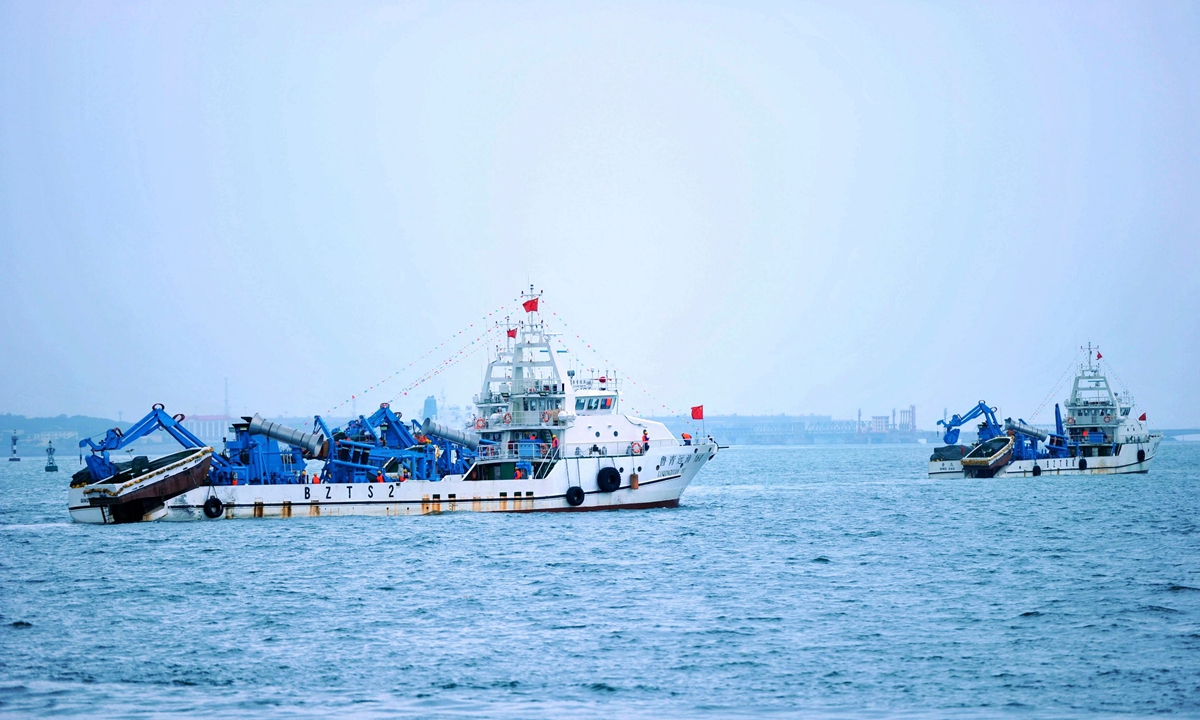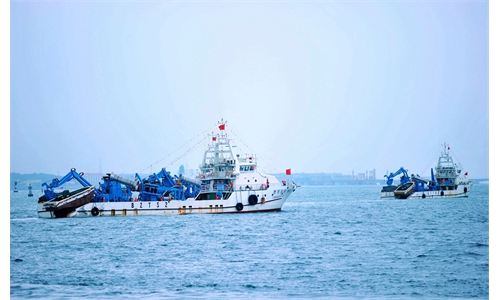
Fishing fleets set sail for the Indian Ocean at a wharf in Qingdao, East China's Shandong Province, on August 29, 2018. Photo: VCG
A second in-person Quad Leaders' Summit, following the Washington summit last September, was held in Tokyo, Japan on Tuesday, with China-related issues being the focus of the meeting, despite the absence of "China" by name in the joint statement. In particular, the Indo-Pacific Partnership for Maritime Domain Awareness (IPMDA) initiative announced in the statement is a direct response to China's maritime activities in the Indian and Pacific Oceans, under the banner of "working with regional partners to respond to humanitarian and natural disasters, and combat illegal fishing." The initiative aims to use satellite technology to create a tracking system for China's "illegal fishing" activities.
Chinese fishing boats have become the direct target of the US, Japan, India and Australia. Illegal, unreported and unregulated (IUU) fishing is a worldwide problem that requires concerted efforts without discrimination. The Chinese government has never shied away from the fact that there are Chinese fishing boats engaging in IUU fishing and has taken many effective measures to regulate China's distant-water fishing activities by raising fines and confiscating fishing vessels. Moreover, China has taken the initiative to conduct a fishing moratorium in some high seas areas. However, various agencies of Quad member countries suggest that Chinese fishing fleet is the biggest culprit of the global IUU fishing.
In fact, China does not have the largest number of fishing vessels in the Indian and Pacific Oceans or even in the world. The number of distant-water fishing vessels is even more limited at less than 3,000, with less aggressive fishing methods. The number of China's IUU fishing activities have significantly declined as China pays more attention to environmental protection, and as relevant authorities become more aware of management and control. However, the Quad members, with anxiety about the so-called China threat, seem to be uninterested in IUU fishing activities of countries other than China. It seems like a joke that the first substantive security action of Quad is aimed at Chinese fishing boats.
The initiative is essentially an attempt to launch a new international campaign to stigmatize China through so-called information sharing. The vast majority of Chinese fishing activities are reasonable and legal. However, the tracking system may not consider China's legitimate rights and interests in these areas, and will only disclose the "abnormal behavior" of Chinese fishing vessels.
Through these data, Quad countries intend to give the global community an impression that Chinese fishing vessels are destroying fishery resources and the environment, working illegally in waters under the jurisdiction of other countries, and even being used to coerce other nations. This will completely stigmatize the normal activities of "Chinese fishing vessels" and stir up endless diplomatic frictions and quarrels with foreign public opinion for China.
The move toward Chinese fishing vessels is likely to be just an "appetizer," Chinese government and Coast Guard vessels, as well as warships, will also become next targets under the surveillance. This is feasible for the Quad's broader surveillance system.
As a result, more news and information about Chinese vessels and warships will appear in diplomatic documents and media in region countries. It will also be possible that countries like the US will interpret the legal passage of Chinese warships as "Look, they are approaching your shores!"
In general, the Quad's IPMDA initiative and the vessel tracking system will not have a direct impact on China's national security and maritime activities. However, the Quad possibly has a more sinister purpose in further amplifying the "China threat" through diplomatic manipulation and media speculation based on data, aiming to fundamentally deconstruct the legitimacy of China's maritime activities.
Maritime situational awareness is supposed to be neutral, requiring the combined efforts of officials, think tanks, and corporates. And the value of its existence is to promote peace, not to stimulate confrontation or conflict. The IPMDA's practice of creating cliques and provoking rivalry between camps will only drive the global maritime order toward competition and conflict.
In recent years, China's normal maritime activities in the region have been met with increasing hypes, questions, and interference from the Quad countries. But these countries insist on increasing their presence and activities around China while smearing China as overreacting and not complying with the principle of freedom of navigation. This is not just a matter of double standards. In essence, the Quad wants to deprive China of the right to peaceful uses of the sea.
The author is the director of the South China Sea Strategic Situation Probing Initiative (SCSPI). opinion@globaltimes.com.cn

